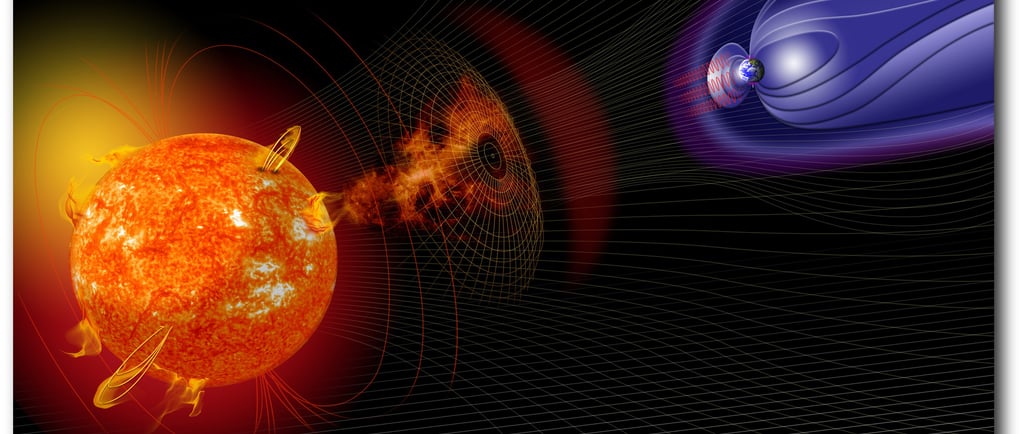items chosen one by one so you have the best option and save money on amazon (Links in articles)
How Space Weather Can Influence the Fate of an Entire Planet
When we think of climate, we usually imagine Earth's atmosphere, weather patterns, or global warming. But there's a bigger — and more cosmic — player influencing the destiny of planets: space weather. This term may sound like science fiction, but space weather is a very real and powerful force. It refers to the conditions in outer space driven by solar activity, radiation, and magnetic fields. And new research suggests it can shape the atmosphere, surface, and even the habitability of a planet. Let’s explore how this invisible force could determine whether a planet thrives — or dies.
5/24/20253 min leer


What Exactly Is Space Weather?
Space weather originates from the Sun, our star at the center of the solar system. It’s caused by high-energy phenomena such as:
Solar flares: Explosions on the Sun that release massive bursts of radiation.
Coronal mass ejections (CMEs): Gigantic bubbles of plasma ejected into space.
Solar wind: A stream of charged particles constantly flowing from the Sun.
Cosmic rays: High-energy particles from outside the solar system.
When these energetic particles and magnetic storms interact with a planet's magnetic field and atmosphere, they can have dramatic effects.
Earth Is Protected — For Now
Earth is relatively lucky. Our magnetic field (also known as the magnetosphere) acts like a shield, deflecting most solar and cosmic radiation.
We also have a thick atmosphere that further protects life on the surface. When solar wind hits the magnetosphere, it creates beautiful auroras — not devastation.
But not all planets are so fortunate.
Mars: A Case Study in Space Weather Devastation
Billions of years ago, Mars may have looked a lot like Earth: flowing rivers, a dense atmosphere, and maybe even microbial life.
But something changed.
As Mars lost its magnetic field over time, solar winds began stripping away its atmosphere, molecule by molecule. Without protection, the once-temperate planet turned into the cold, barren desert we see today.
What we’ve learned:
Space weather can erode planetary atmospheres
Without a magnetic shield, life — or the possibility of it — is highly vulnerable
Mars offers a terrifying preview of what can happen when space weather goes unchecked
Could It Happen to Earth?
In the short term, Earth’s magnetic field is still strong. But scientists are concerned.
The field has weakened by about 9% over the past 200 years
The magnetic poles are drifting and could eventually reverse
A weakened magnetic field could mean greater radiation exposure for Earth
While a full atmospheric collapse is unlikely anytime soon, the increasing solar activity during solar maximum cycles could disrupt satellites, GPS systems, power grids, and aviation — already happening in minor events.
In extreme cases, solar storms could cripple modern technology and economies.
Space Weather and Exoplanets: Can They Host Life?
Astronomers now factor space weather into the search for habitable planets beyond our solar system.
A planet located in the “Goldilocks zone” (not too hot, not too cold) isn’t enough. If it's too close to an active star that constantly bombards it with radiation, its atmosphere might not survive.
Some Earth-sized exoplanets around red dwarf stars (common in the universe) likely face intense magnetic storms, making them hostile to life as we know it.
So even if a planet has water, oxygen, and the right temperature — space weather could make it uninhabitable.
The Role of NASA and ESA in Monitoring Space Weather
Agencies like NASA, the European Space Agency (ESA), and Japan’s JAXA are heavily invested in understanding and forecasting space weather.
They operate satellites and observatories such as:
SOHO (Solar and Heliospheric Observatory)
Parker Solar Probe
Solar Orbiter
DSCOVR (Deep Space Climate Observatory)
Their goal is to develop an early warning system — like a “space weather forecast” — to prepare Earth and satellites for major solar events.
But these missions also help scientists predict how space weather affects the evolution of planets, both in our solar system and beyond.
Why This Matters to You
Even if you're not an astronaut or astronomer, space weather has real-world implications:
It affects communications, navigation systems, and electric power
It may impact future space tourism and Mars colonization
Understanding it helps us prepare for extreme solar storms and protect critical infrastructure
On a cosmic level, it helps us answer the question: Are we alone in the universe?
By understanding space weather, we also better understand the delicate balance that allows life to exist — and how easily it can be undone.
Final Thoughts: Space Weather Is More Than Science Fiction
It’s an invisible but powerful force shaping the solar system and the universe at large.
Planets rise or fall under its influence.
Atmospheres are born, sustained, or destroyed by it.
And as we dream of exploring new worlds, space weather reminds us that habitability isn’t just about water or temperature — it’s about protection from the stars themselves.
Want to explore more cosmic science like this?
Stay tuned at luxuahead.com for articles on space technology, astronomy breakthroughs, and how science fiction is becoming science fact.